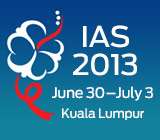 Following the apparent functional cure of a baby born to an HIV-positive mother in Mississippi, scientists have designed a long-term global trial in an attempt to repeat that success, Nature.com reports. Investigators participating in the trial, which is sponsored by the International Maternal Pediatric Adolescent AIDS Clinical Trials (IMPAACT) Group, announced their trial design at a symposium on HIV cure research at the 7th International AIDS Society Conference on HIV Pathogenesis, Treatment and Prevention (IAS 2013) in Kuala Lumpur.
Following the apparent functional cure of a baby born to an HIV-positive mother in Mississippi, scientists have designed a long-term global trial in an attempt to repeat that success, Nature.com reports. Investigators participating in the trial, which is sponsored by the International Maternal Pediatric Adolescent AIDS Clinical Trials (IMPAACT) Group, announced their trial design at a symposium on HIV cure research at the 7th International AIDS Society Conference on HIV Pathogenesis, Treatment and Prevention (IAS 2013) in Kuala Lumpur.
Conducted in IMPAACT’s 71 sites around the world, the study will screen hundreds of infants in an attempt to find about 20 to 30 babies infected with HIV by mothers who, like the woman in the Mississippi case, were not treated for the virus during their pregnancies, or whose virus was not well controlled during the baby’s gestation. All of the babies will be treated with a three-drug antiretroviral (ARV) cocktail within 48 hours of birth, similar to the intensified treatment regimen given to the functionally cured baby. Following the week required to accurately test for HIV in the infants, those who test positive will receive a fourth ARV.
After about three years on therapy, the children will undergo screening to see whether there is evidence of HIV antibodies in their blood and whether their immune systems are producing the antibodies. In children who test negative for both screens, treatment will then be stopped in the hope that they will not experience viral rebound.
To read the Nature story, click here.
Advertisement
Advertisement
Advertisement






Comments
Comments